https://www.lifegate.it/nuova-zelanda-divieto-esportazione-animali-vivi
- |
- As of April 30, the export of live animals from New Zealand is prohibited.
- The decision is also the result of a very serious accident that occurred in 2020.
On April 20, just before 6 am (local time), the ship Dareen she set sail from the New Zealand port of Timaru with just over six thousand live cattle on board.It is headed to Huanghua, China, where it will arrive around May 9. It was the last.In fact, starting from April 30th, the ban on the export of live animals comes into force.There New Zealand it is the first nation in the world to introduce a similar measure as a form of protection for animal welfare.

How the live export ban works in New Zealand
The NGO Animals Australia informs that already in 2008 the New Zealand government had introduced an initial ban on the shipment of animals for slaughter, but those of pregnant dairy cows remained permitted.In 2021 he therefore announced the definitive one ban on the export of live animals, however giving operators in the sector two years to adapt.
The agency Reuters announces that in 2022 the turnover of the sector was equal to just under 300 million euros.If compared to the value ofprimary sector exports, which also includes the mines and agriculture, that of live animals it's a small percentage:just 0.32 percent.
Because transporting live animals is dangerous
For some time, animal rights organizations have been drawing attention to conditions of deprivation and suffering where live animals were forced to travel for days, if not weeks.However, it was one episode in particular that shook consciences.In September 2020 one ship cargo ship with around six thousand cattle and 43 crew members on board, headed towards the Chinese port of Jingtang, found itself off the coast of Japan in prohibitive weather conditions due to the passage of typhoon Maysak. She lost her engine and sank.Only two crew members survived.
The episode had a wide international echo and convinced the government first to suspend, and then to definitively ban the export of live animals.“Our position on the map means that the journey to the Northern Hemisphere is inevitably long and therefore poses unacceptable risks to animal welfare,” the Agriculture Secretary said. Damien O'Conner.Environmental organizations applaud, inviting other countries to “give priority to animal welfare and not commercial interests”.
